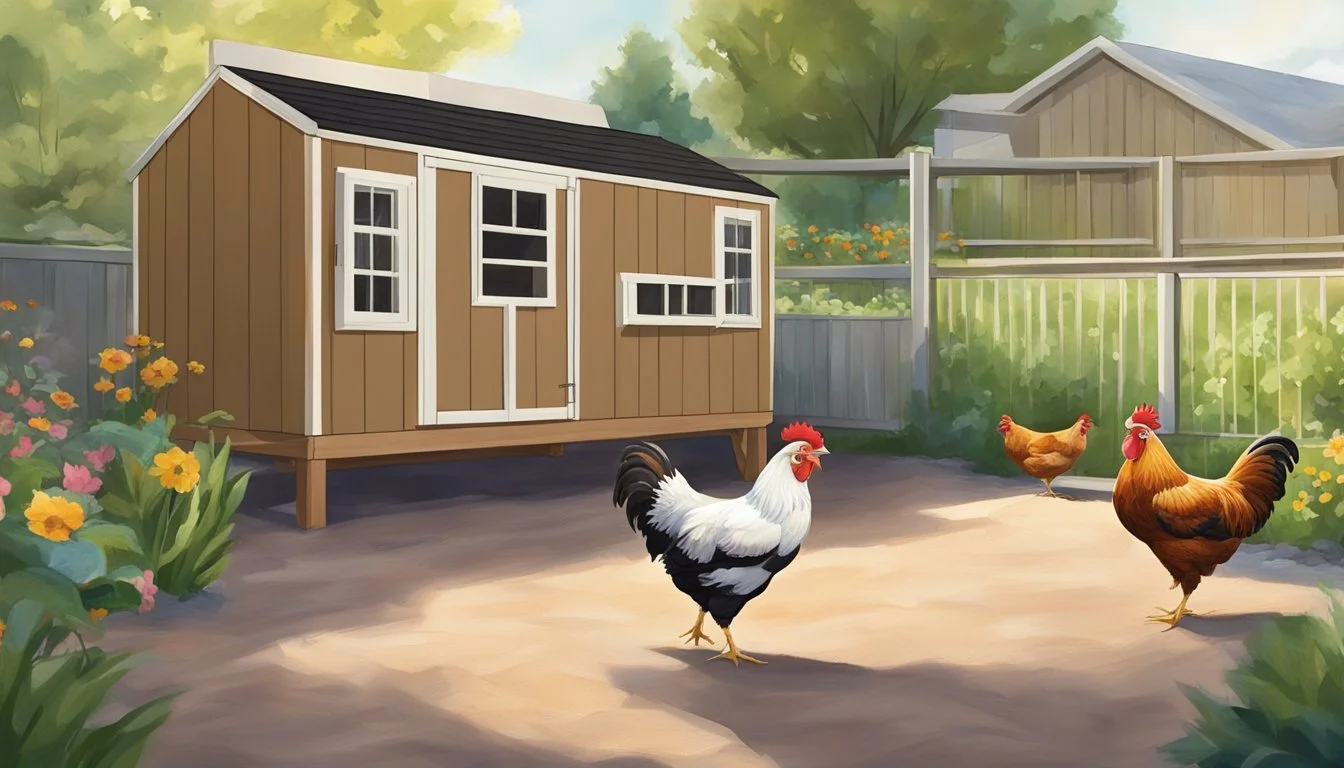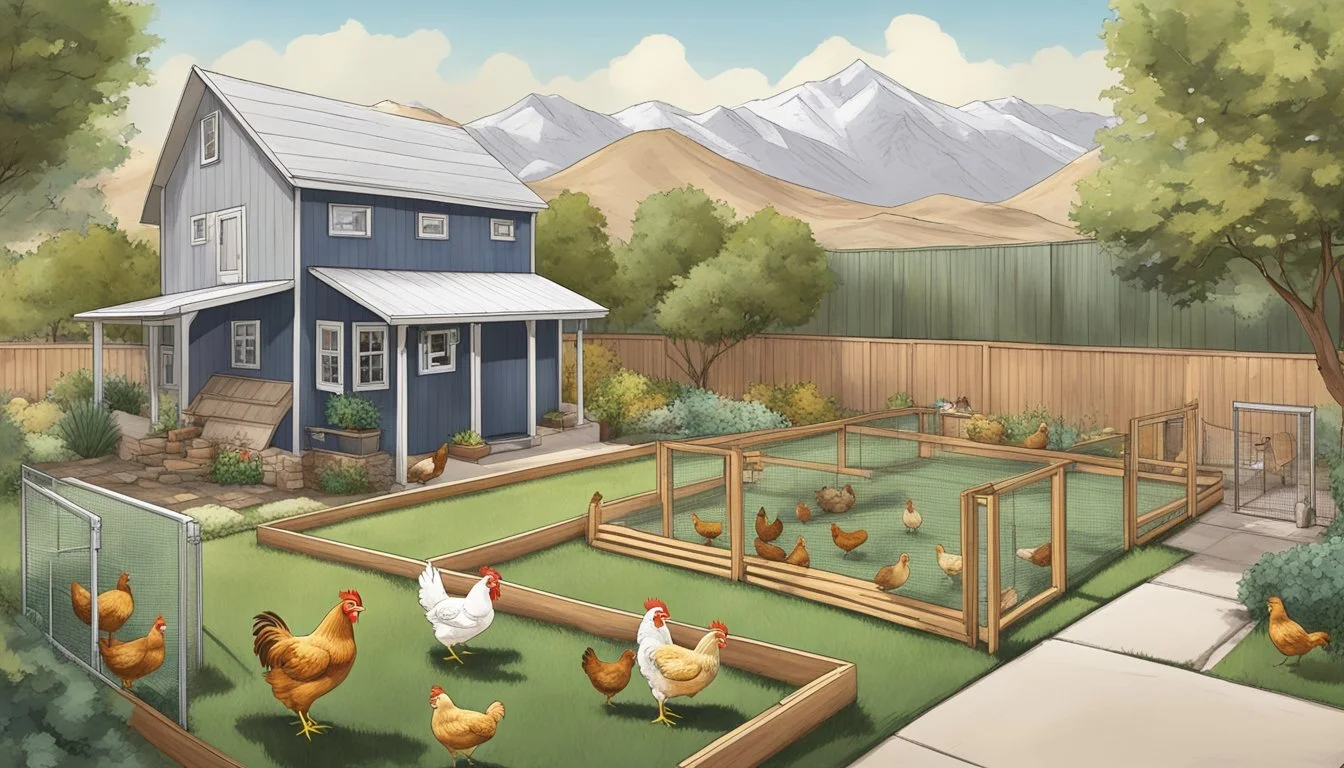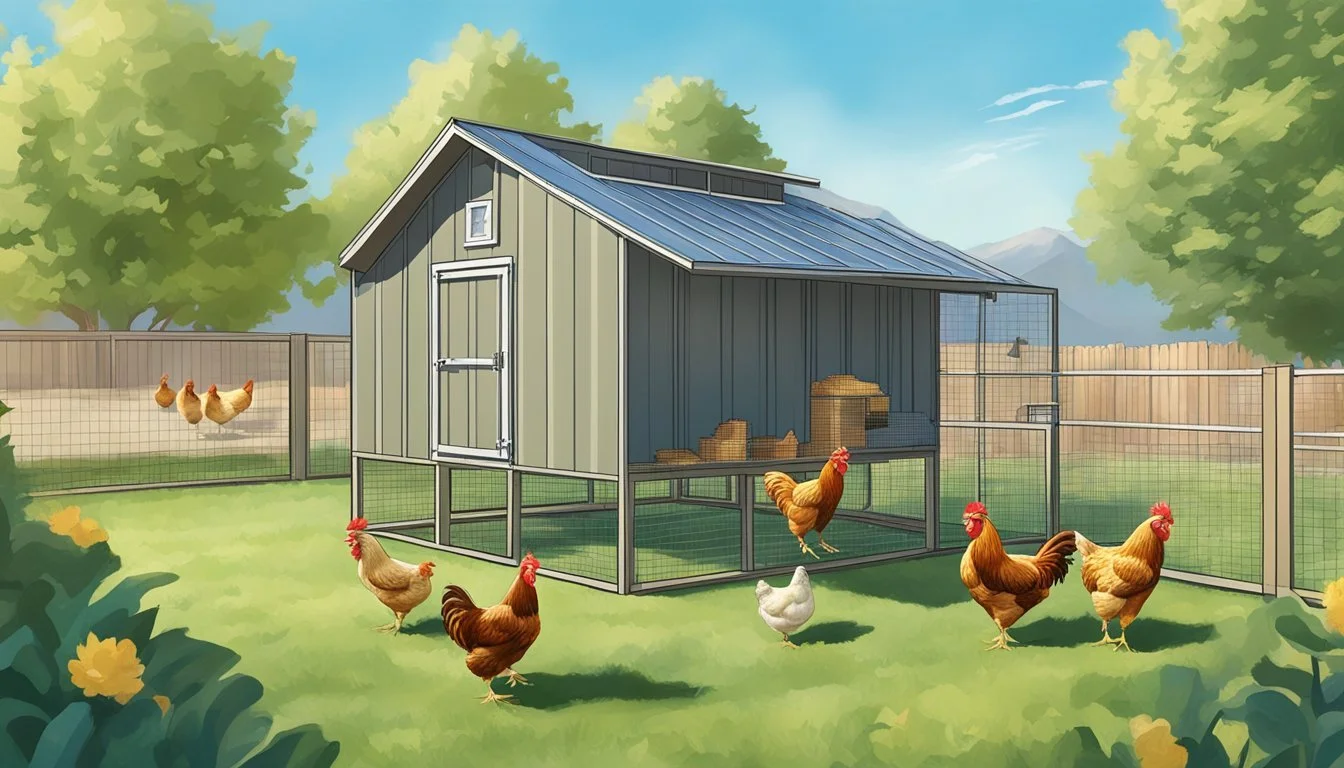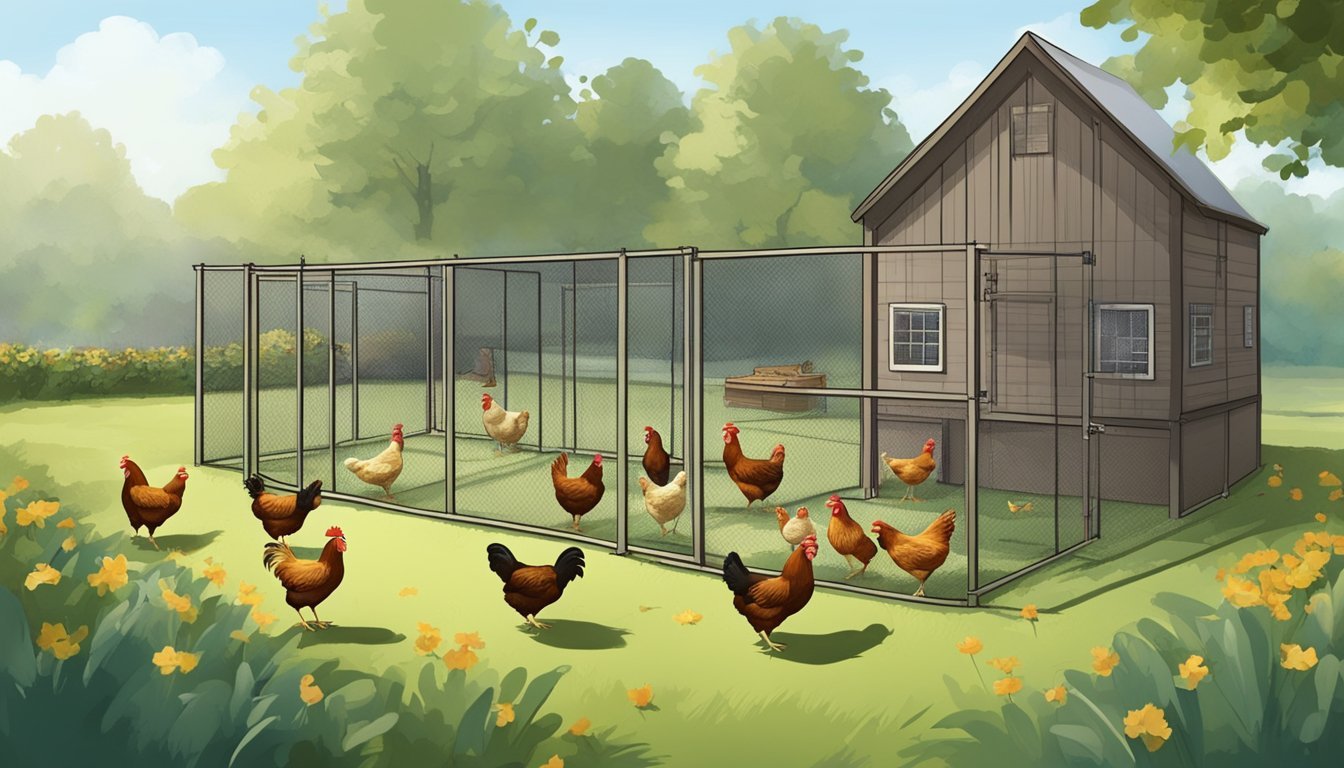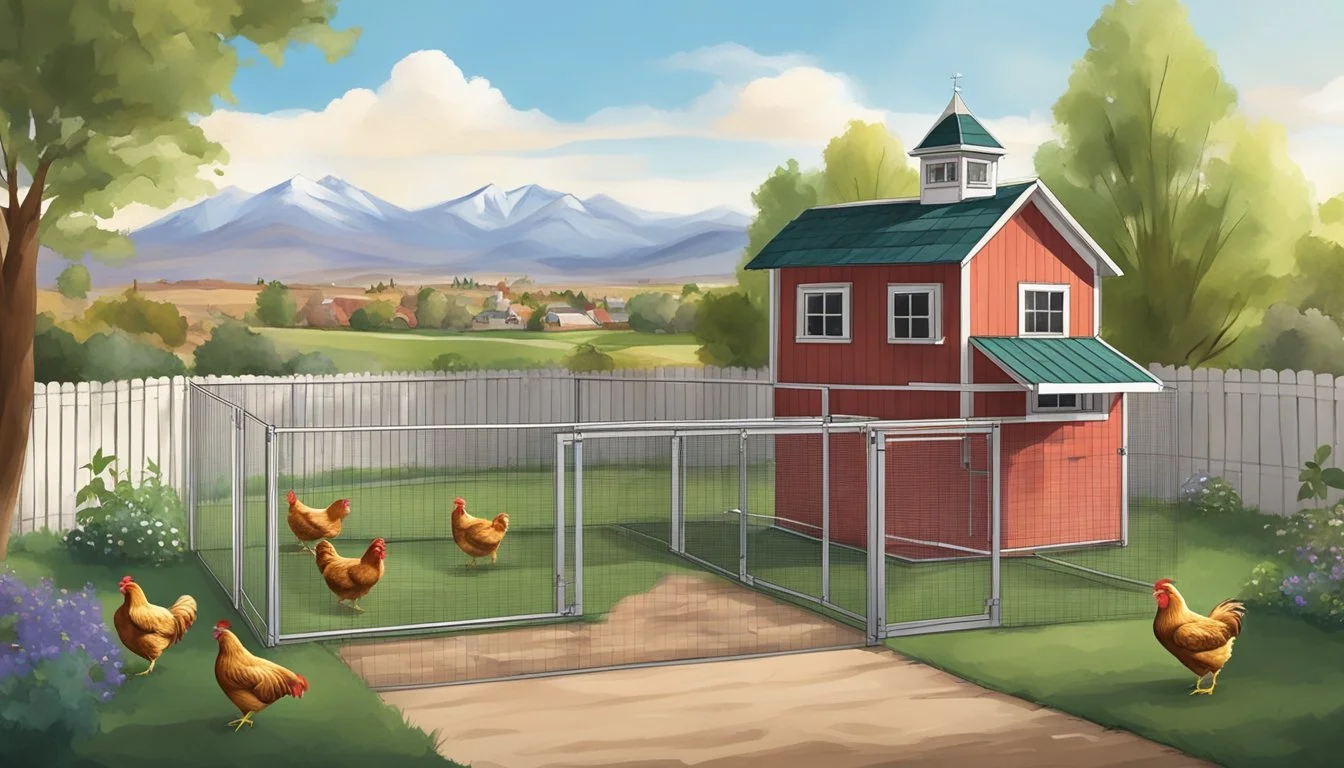Keeping Backyard Chickens in West Jordan, UT
Essential Tips for Local Poultry Enthusiasts
Raising backyard chickens in West Jordan, Utah, is becoming an increasingly popular activity for residents looking to enjoy fresh eggs and the pleasures of urban poultry farming. The city permits the keeping, breeding, and maintenance of fowl within its residential zones with proper approval. To ensure harmony and public health, the city has established guidelines on the number and type of chickens allowed, as well as the housing structures required for their upkeep.
Residents of West Jordan are allowed to keep up to 5 egg-laying hens, though roosters are generally prohibited due to noise concerns. In addition, up to 5 chicks may be maintained under specific conditions. These regulations aim to balance the interests of chicken enthusiasts with those of their neighbors. Appropriate shelter, such as a coop, is mandatory for the health and safety of the chickens, which must also comply with any applicable homeowners' association rules.
It's essential for prospective and current chicken owners in West Jordan to be well-informed about their responsibilities. They must adhere to the city's standards regarding space, cleanliness, and care for the birds. As communities grow more sustainable and self-reliant, understanding local ordinances ensures that raising backyard chickens contributes positively to both personal and community well-being.
Legal Framework for Keeping Chickens
In West Jordan, Utah strict regulations govern the ownership and maintenance of backyard chickens to ensure community harmony and animal welfare. Compliance with these laws is essential for responsible chicken keeping.
Understanding West Jordan Chicken Laws
West Jordan's legislation permits the ownership of chickens within its city limits subject to specific conditions. Residents must keep in line with the West Jordan City Chicken Ordinance. The key stipulations are:
Chickens are not classified as household pets.
The housing for chickens must provide adequate shelter and space.
Coops and runs must meet minimum size requirements.
Property type, such as single-family homes, can determine eligibility to keep chickens.
Violating these regulations can lead to penalties, potentially as severe as a Class B misdemeanor, signifying the city's commitment to these laws.
State-Wide Regulations
Across the state of Utah, each municipality may have individual chicken laws, but all must align with broader state legislations governing animal welfare and public health regulations. These laws can affect the:
Production and consumption of eggs: Guidelines are in place to ensure food safety.
Maintenance of chicken coops: State laws may dictate overarching requirements for coop construction and maintenance.
Residents must be aware that state regulations can supersede local ordinances, and it is their responsibility to comply with both sets of laws.
Local Ordinances in Surrounding Municipalities
Adjacent to West Jordan, different cities might have their own unique local chicken laws. This is relevant for residents near city boundaries or those considering relocation. It’s important to understand that:
Municipalities may require a permit and possibly a fee for keeping chickens.
Local government offices can provide detailed ordinances related to the number of chickens allowed, coop specifications, and the handling of violations.
Residents should consult their specific municipality to ensure adherence to local regulations, since discrepancies can exist between neighboring areas.
Setting Up Your Backyard for Chickens
When preparing a backyard in West Jordan, UT, for chickens, residents need to consider local zoning laws, coop design requirements, and space management. These elements are crucial for a successful and complaint-free backyard chicken experience.
Zoning and Property Requirements
In West Jordan, the ownership and maintenance of chickens are allowed, but with specific property regulations. Property owners must ensure they meet the following criteria:
Coop Location: Coops should be situated at least 30 feet from any habitable dwelling on an adjoining lot.
Lot Size: A residential lot must have adequate space to support chicken keeping while complying with city zoning laws.
Minimum Distance from Requirement Rear Yard 50 feet Interior Side Yard 10 feet Primary Structure Coop must comply with regulations for accessory buildings
Design and Specifications of Chicken Coops
The design of a chicken coop in West Jordan must adhere to certain specifications to ensure the welfare of the chickens and compliance with city codes:
Structural Integrity: Coops should be sturdy, weather-resistant, and predator-proof.
Ventilation: Proper ventilation is critical for the health of the chickens.
Accessibility: Coops must be designed for easy access to collect eggs and for cleaning purposes.
Proper Enclosures and Space Management
Chickens require both safe enclosures and enough space to roam, forage, and exhibit natural behaviors:
Enclosure Size: A minimum of 10 square feet per chicken is recommended within the enclosure for ample movement.
Vegetative Screening: It must be provided around the coop and the enclosure for aesthetic purposes and to minimize noise and odor impact.
Space Management: Owners should prevent overcrowding to provide a healthy living environment for the chickens.
Following these guidelines ensures the well-being of backyard chickens and the harmony within the community. Proper set-up also minimizes the chance of complaints or legal issues related to backyard chicken keeping in West Jordan, UT.
Caring for Your Chickens
Proper care of backyard chickens in West Jordan, UT encompasses a well-balanced diet, routine health checks, and regular coop maintenance to ensure a healthy flock.
Nutrition and Feeding
Chickens require a diet rich in protein, especially layers for egg production. They typically eat commercial feed composed of grains, vitamins, and minerals.
Start chicks on a high-protein starter feed.
Transition hens to a layer feed with adequate calcium.
Provide constant access to clean, fresh water, changing it daily to prevent algae and bacteria growth.
Health and Veterinary Care
Regular veterinary checks help in early detection of diseases, ensuring that chickens are vaccinated and dewormed as necessary.
Watch for common signs of illness such as lethargy, decreased appetite, or abnormal droppings.
Protect against rodent infestations to prevent disease and feed contamination.
Cleaning and Maintenance
Regular maintenance of the coop is crucial for chicken health and egg safety.
Remove droppings and wet bedding at least once a week to maintain good ventilation and hygiene.
Deep clean the coop every few months, replacing all bedding and disinfecting surfaces.
Building a Chicken Community
Growing a chicken community in West Jordan, UT involves collaboration with neighbors, sharing resources, and utilizing local expertise. It can promote a sense of togetherness and provide a support network for both novice and experienced chicken keepers.
Engaging With Neighbors and Local Chicken Groups
Fostering neighborly relationships is key to creating a harmonious chicken community. Residents interested in keeping chickens can start by discussing their plans with their neighbors, addressing any concerns, and highlighting the benefits of raising chickens, such as fresh eggs and natural pest control. A cooperative community encourages mutual respect and consideration, aspects crucial to maintaining a positive environment for urban poultry. Furthermore, engaging with local chicken groups offers a platform for sharing experiences, advice, and resources. Joining online forums related to backyard chickens in West Jordan can lead to connections with fellow enthusiasts.
Local Groups to Consider:
West Jordan Chicken Owners: A community-focused group that meets monthly to discuss backyard chicken care.
Salt Lake City Poultry Enthusiasts: Offers support for surrounding communities, including West Jordan.
Educational Resources and Workshops
Educational resources are an invaluable tool for a flourishing chicken community. They can help ensure that chicken owners are well-informed about best practices for coop design, chicken health, and local regulations. The USU Extension is an excellent source of knowledge, offering articles, guides, and contact with poultry experts.
Upcoming Workshops at USU Extension West Jordan:
Coop Building Fundamentals: March 12, 2024
Chicken Health 101: April 9, 2024
Workshops like these present opportunities for community members to learn in a hands-on setting while networking with other chicken enthusiasts. By attending educational workshops and sharing this knowledge, chicken keepers play a pivotal role in sustaining and nurturing the local poultry community.
Chicken Ownership and Daily Routines
In West Jordan, Utah, the ownership and daily care of chickens requires adherence to specific municipal codes and a personal commitment to the birds' wellbeing. The following sections detail the daily activities and checklists adhered to by chicken owners, as well as the long-term commitments they undertake.
Daily Activities and Checklists
Morning:
Release Chickens: Owners typically let chickens out of the coop at sunrise to ensure they have enough time for foraging and exercise.
Feed and Water: Chickens receive a balanced feed; fresh water is a must.
Collect Eggs: Laying hens typically lay eggs in the morning, so egg collection is often a daily task.
Observe Behavior: A quick health check of each chicken can alert owners to potential issues.
Evening:
Secure Chickens: As dusk approaches, chickens naturally return to their coop to roost. Owners must ensure they're safely inside to protect them from predators.
Refill Feeders/Waterers: Preparing for the next morning, the feeding station is replenished.
Clean Coop: Depending on the setup, owners may do quick spot cleanings daily.
Long-Term Commitments
Regular Coop Maintenance: The coop must be maintained and kept clean to prevent disease, with a thorough cleaning scheduled regularly.
Health Care: Chickens need routine health checks and care for any ailments or injuries.
Adherence to Regulations: Owners must remain compliant with local ordinances, including coop specifications and the number of chickens allowed.
No Roosters: West Jordan's regulations often do not permit roosters in backyard settings due to noise concerns.
Lifetime Care: Chickens can live several years, with laying hens actively laying for a portion of that time. Owners must consider care for chickens even after their laying years.
Through consistent daily routines and a firm understanding of long-term commitments, families in West Jordan can successfully manage the ownership and maintenance of chickens, enjoying fresh eggs for consumption while providing care for their flock.
Common Challenges and Solutions
When keeping backyard chickens in West Jordan, UT, residents commonly encounter issues such as managing noise and odors, dealing with predators and pests, and effectively handling waste. Addressing these challenges promptly can ensure a healthy and harmonious environment for both the chickens and their owners.
Managing Noise and Odors
Chickens can produce noise, particularly from crowing hens, and generate odors that may affect neighbors. To manage noise, owners should:
Provide proper nesting: Encouraging hens to use nesting boxes can minimize noise since hens are quieter when they have a comfortable place to lay.
Regulate light exposure: Reducing the amount of light hens are exposed to can decrease their activity and noise levels.
For odor control, they should:
Clean regularly: Frequent cleaning of the coop reduces odor buildup.
Use proper bedding: Absorbent materials like straw or wood shavings can help contain odors.
Dealing With Predators and Pests
Backyard flocks can attract predators and pests, including rodents and other wildlife. Preventative measures include:
Securing the coop: Ensuring the coop is sturdy and gaps are sealed deters predator intrusion.
Removing attractants: Properly dealing with unused eggs and dead birds quickly limits attraction to the area.
Waste Management and Composting
Effective waste management is vital for a clean coop and composting can be beneficial. To manage waste:
Implement a cleaning schedule: Regular removal of waste keeps the coop sanitary.
Start a compost bin: Chicken waste is high in nitrogen, making it excellent for composting.
Properly composted chicken manure enriches garden soil and reduces waste sent to landfills. Residents should maintain the right carbon to nitrogen ratio by adding carbon-rich materials like dry leaves or straw to their compost bins.
Benefits of Backyard Chickens
Backyard chickens provide a range of advantages, from the tangible rewards of fresh produce to the intangible benefits of education and environmental sustainability. They offer a multifaceted experience that extends beyond basic poultry care.
Fresh Eggs and Sustainability
Backyard chickens in West Jordan are a source of fresh eggs, yielding a constant supply that can be more nutritious than store-bought alternatives. Residents of West Jordan can enjoy eggs that are free from additives or preservatives, ensuring a healthier choice for their families. Moreover, the process contributes to sustainability efforts; chickens naturally recycle food scraps into eggs, while their waste can serve as an organic fertilizer, enhancing soil quality in gardens.
Nutritious Eggs: Eggs from backyard chickens often contain a higher vitamin and omega-3 content than those purchased from a supermarket.
Reduced Waste: Kitchen scraps become valuable feed, reducing the amount of waste sent to landfills.
Organic Fertilizer: Chicken droppings can be composted and used to enrich garden soil.
Educational Value for Families
Keeping chickens can be a powerful educational tool for families, with children benefiting from first-hand lessons in responsibility, animal husbandry, and the origins of food. They learn the value of caring for animals and witness the food cycle in real-time. For families in West Jordan, this hands-on approach fosters a deeper understanding of ecology and agriculture that textbooks alone cannot provide.
Lessons in responsibility: Daily tasks help teach children about routine care and maintenance of living creatures.
Understanding of food production: Families gain insight into where their food comes from by participating in egg collection and chicken care.
Witnessing life cycles: The process from egg to chicken illuminates biological cycles for children, enhancing their natural curiosity.
Regulations on Chicken Products
In West Jordan, UT, individuals keeping backyard chickens must adhere to specific regulations pertaining to the sale and handling of chicken products like eggs. These regulations are in place to ensure public health and compliance with commercial restrictions.
Egg Sales and Commercial Restrictions
West Jordan residents are allowed to sell eggs laid by their backyard chickens, but they must follow the city's guidelines to ensure they do not cross into commercial territory. Sales are typically meant for small-scale, personal income rather than large-scale commercial operations. It's important that sellers keep in mind:
Egg-Laying: Eggs must be produced by chickens that are kept in accordance with West Jordan's backyard chicken laws.
Sale: The sale of eggs from backyard chickens is considered allowable as long as it does not evolve into a large-scale commercial business.
Income: Income from selling eggs should be incidental and not the primary source of revenue for the household.
Health Regulations and Best Practices
The health of the community is paramount, and thus, producers must observe strict health regulations concerning egg production and distribution. Producers must ensure:
Egg Production: Eggs should be collected frequently and stored properly to minimize the risk of contamination.
Health Regulations: Individuals selling eggs must comply with local health department guidelines, which includes ensuring eggs are clean, uncracked, and properly labeled with sale dates and safe handling instructions.
By following these rules, residents of West Jordan contributing to local food systems can do so in a responsible and community-conscious manner.

